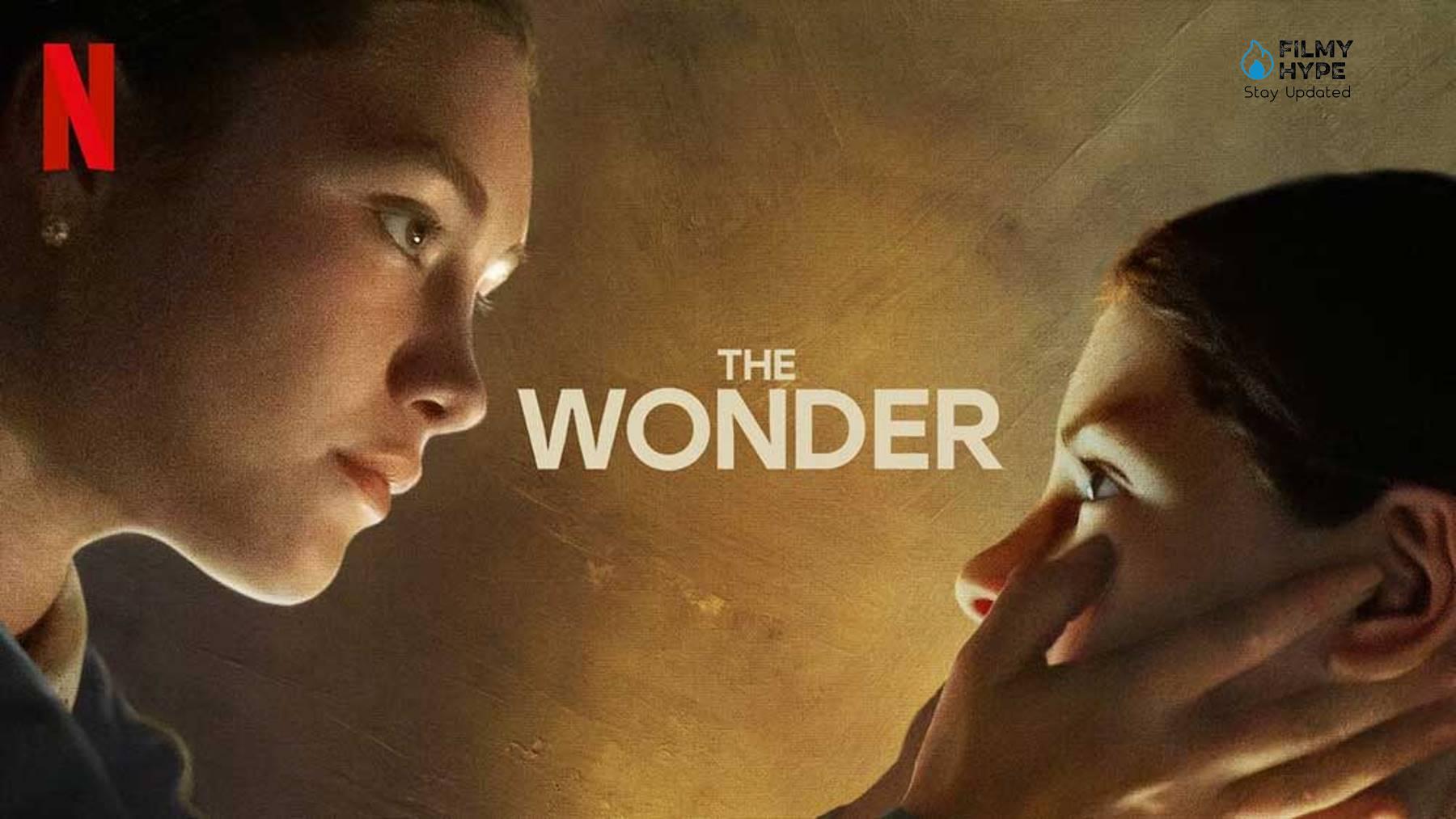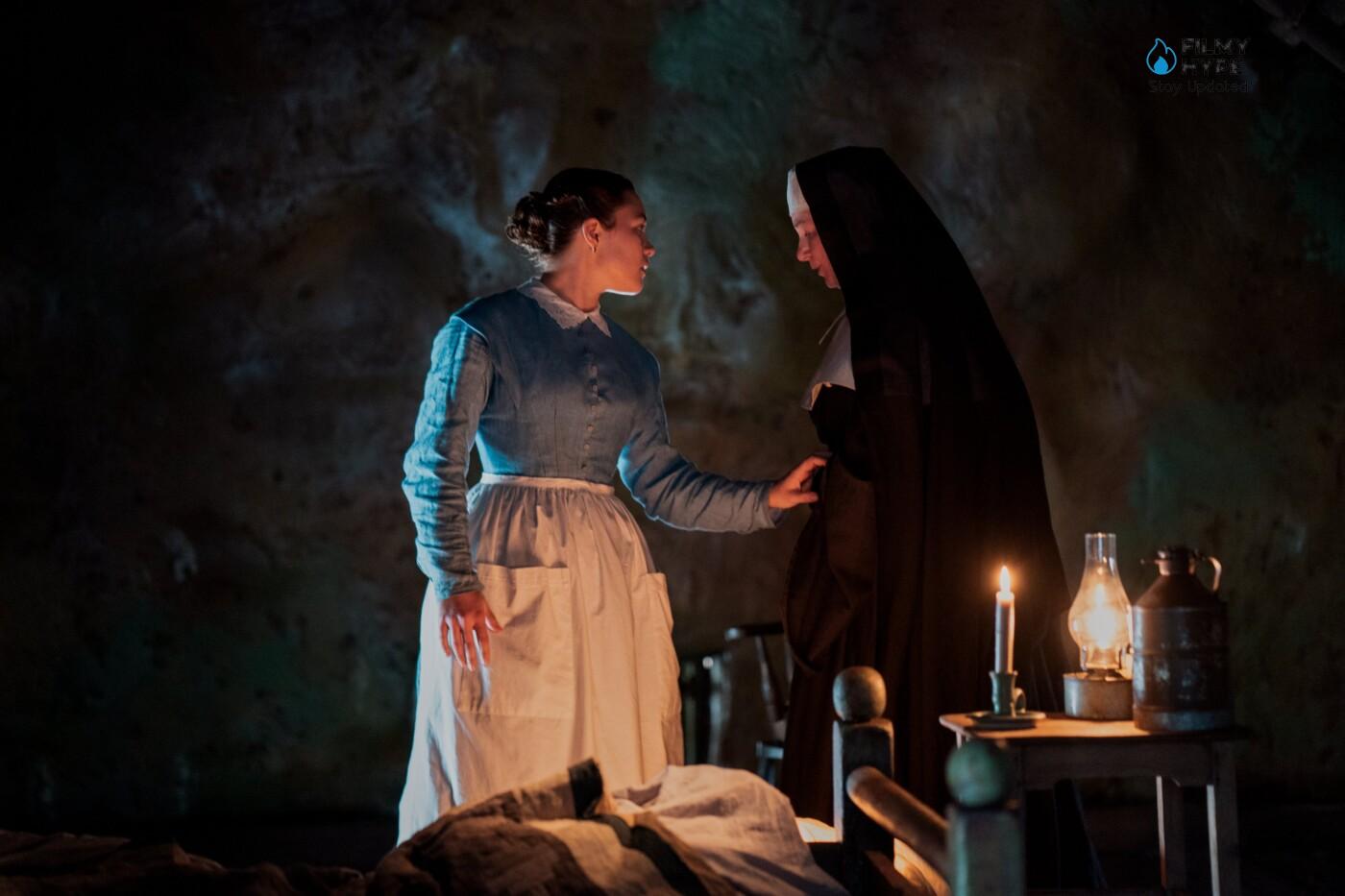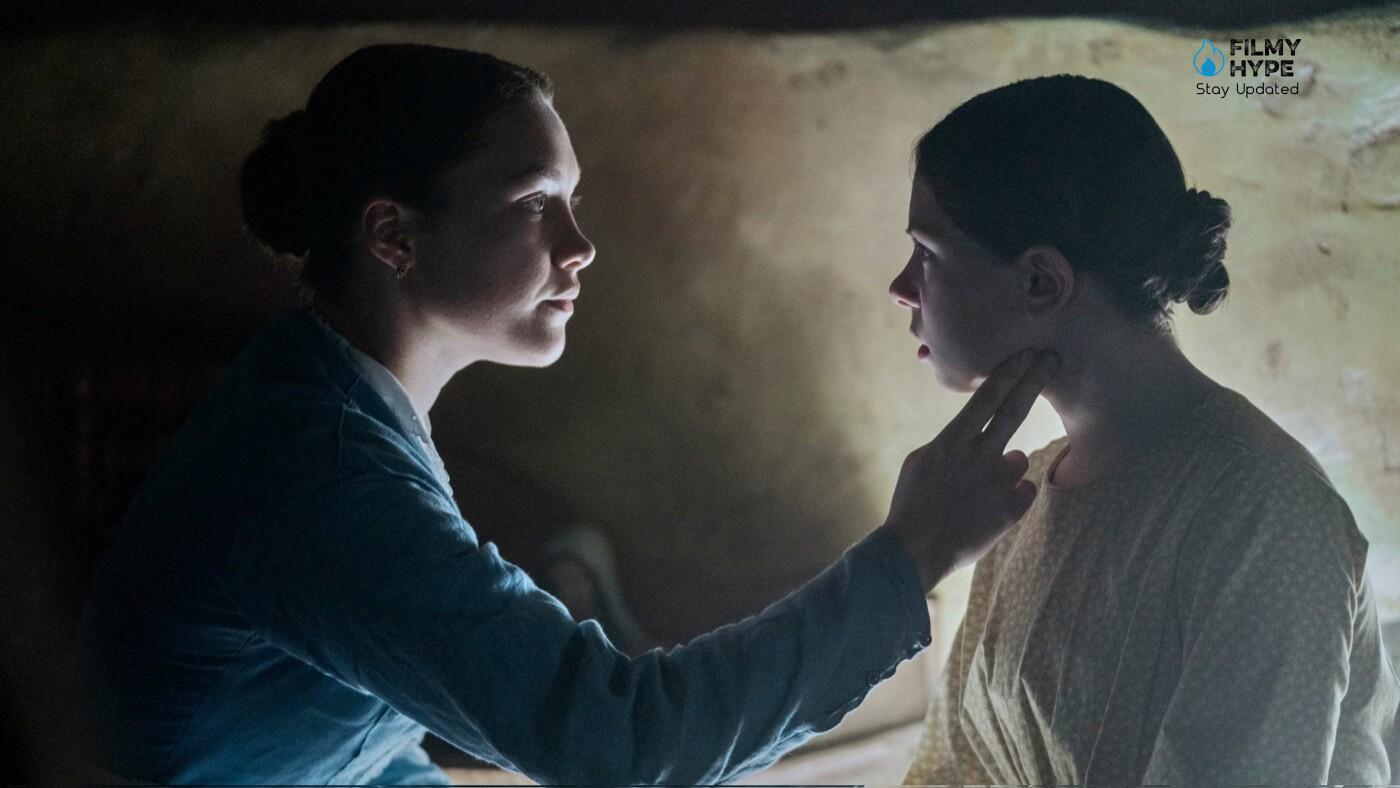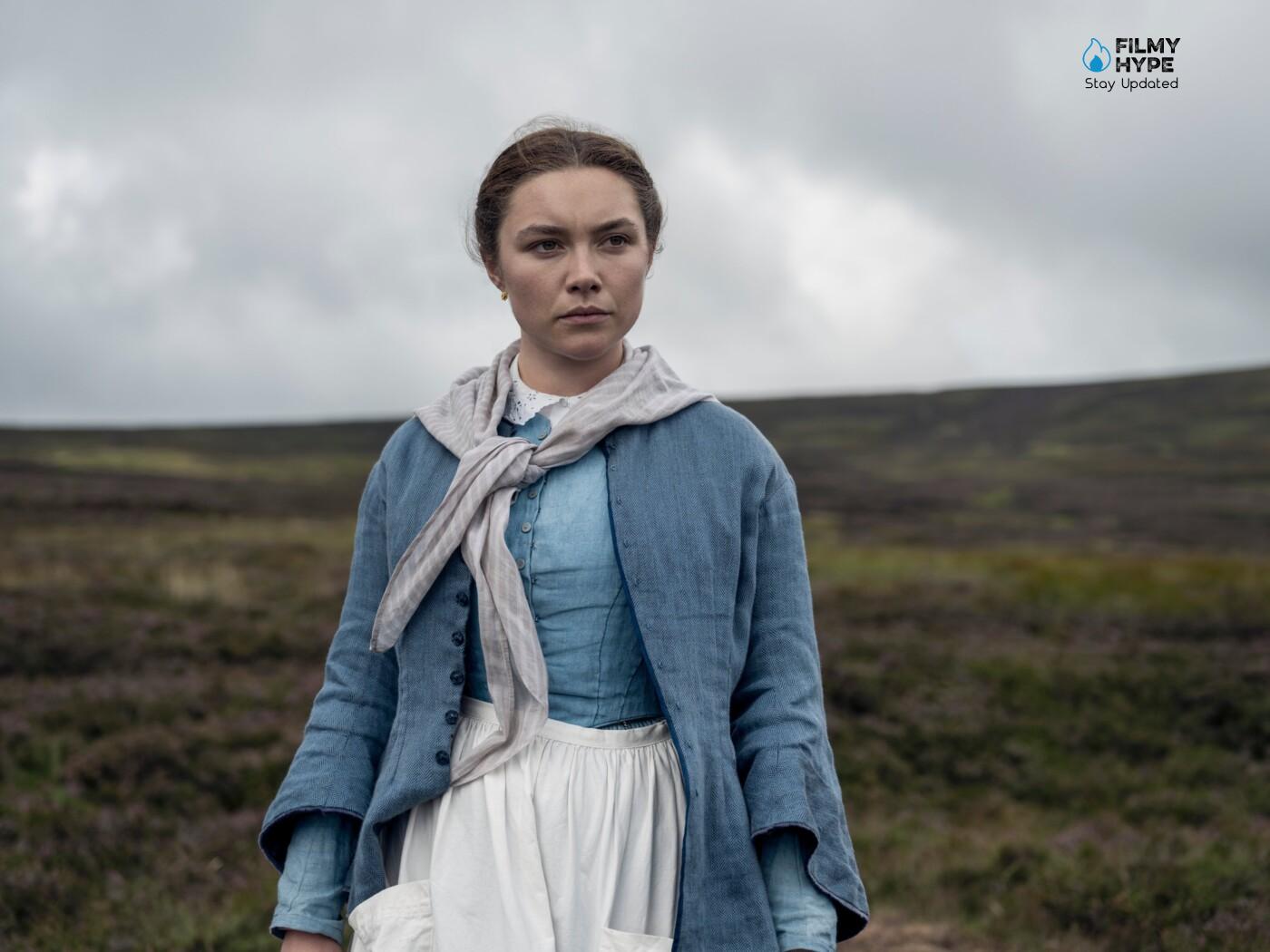The Wonder Review: Dark Mystery or Divine Miracle? Clash Between Science and Faith | Netflix Film
Cast: Florence Pugh, Tom Burke, Niamh Algar, Elaine Cassidy, Kíla Lord Cassidy, Dermot Crowley, David Wilmot, Josie Walker, Brían F. O’Byrne, Toby Jones, Ciarán Hinds
Director: Sebastián Lelio
Streaming Platform: Netflix
Filmyhype.com Ratings: 4/5 (four stars)
The Wonder, the film by Sebastian Lelio on Netflix from November 16th. Florence Pugh is everywhere lately, and we have to admit she doesn’t mind. After the highly discussed Don’t Worry Darling, here she is with The Wonder, the period drama of 2022 directed by Sebastián Lelio. The screenplay is by Emma Donoghue, Lelio, and Alice Birch. The film draws inspiration from the 2016 novel of the same title written by Donoghue himself. As we will see in this review of The Wonder, the incipit chosen by Lelio is perhaps a little redundant, and unnecessary, because the most intimate meaning of the film becomes clearer and clearer the more the narration progresses and slowly captures us. And acting as a link between a brutally fascinating story and us spectators is the splendid interpretation of Florence Pugh, an actress who once again proves to be among the most gifted of her generation.

The Wonder opens with a particular narrative plot: we find ourselves in a sort of props warehouse, where we sense the work, we are about to see is about to be shot. Niamh Algar’s voiceover explains to us that what we will be witnessing is a fictional story, but that stories in general have great power, which comes from the strength with which we believe in them. We, spectators, are transported into a story which, despite being invented, will seem extremely real to us; at the same time the characters we will meet deeply believe in certain “stories”, which they are convinced are tangible, well-founded, and concrete. And that shapes their entire experience of the world, of life. Sebastian Lelio thus decides to open his film based on the homonymous novel by Emma Donoghue, providing the viewer with a key to understanding everything he will see happening on the screen: this work takes off from the power of stories, beliefs, and faith. What can we do to ourselves – and others – if guided by the belief that we are right, that we know the truth?
The Wonder Review: The Story
Set in 1862, Lib Wright (Florence Pugh) is a nurse trained by pioneer Florence Nightingale, with the harsh experience of the battlefields of the Crimean War behind her. The woman, who is still struggling with the pain of a bereavement that marked her existence, is hired for a very particular job: she will have to travel to Ireland marked by famine to observe what everyone defines as a “prodigy”. An eleven-year-old girl, Anna (Kíla Lord Cassidy), hasn’t eaten for four months: the little girl, who claims to feed only on divine love, is perfectly healthy, and no one can explain how this is possible.
A committee made up of the local priest and doctor and other representatives of the small community have decided that a nurse and a nun will have to observe the little girl, taking turns during the hours of the day and night, trying to discover the mystery behind his miraculous fasting. Many are convinced that Anne has been touched by divine power and that she may be the first saint that the remote Irish region has seen for centuries. Lib will find herself observing the little girl for many days, shocked by her apparent ability to survive without feeding. Over time, however, getting to know both her and her family better, she will realize that behind this apparent miracle dark secrets are hidden.

The screenplay, signed in part by Lelio himself, is based on the novel of the same name by Emma Donoghue, a Canadian writer of Irish origin who has already brought one of her works to the cinema through Room, the film that earned Brie Larson an Oscar. This time we are not in contemporary America, but in Ireland in the second half of the nineteenth century. Lib Wright, an English nurse who cut her teeth under Florence Nightingale, is sent to investigate an alleged miracle: the case of Anna O’Donnell, an eleven-year-old girl who is still alive despite having not eaten for four months. This has transformed the community into a destination for religious tourism, and Lib must monitor Anna together with a nun to understand the origin of the strange phenomenon. The London journalist William Byrne is also interested in the matter and tries to get information from the nurse.
The Wonder Review and Analysis
The character of Lib, who comes from the more “civilized” England in a barren, hungry Ireland deeply tied to popular and religious beliefs, represents the saving power of science and reason. Be careful, because the intent of Lelio’s story (and Emma Donoghue before him) is not anti-religious, but openly takes sides against any type of extremism. Apart from the young nurse, the other characters in the film are guided by beliefs that prevent them from seeing objectively what appears before their eyes, which for this reason causes harm even though they believe they are on the side of good. Some have found confirmation of their faith in God and his beneficial intervention; who, like the local doctor, is sure he has discovered the secret of eternal youth; then there is the family who loads the responsibility of expiating faults not hers on the shoulders of the little girl. Only Lib sees Anna for who she is: a child who may soon starve to death.
The story unfolds by skilfully mixing drama and thriller, leading us to discover the mystery behind the “prodigy” that is the title of the film, building ever more tense atmospheres. Lelio relies on a series of particularly suggestive locations and on a photograph that uses natural lights to his advantage, conveying, even more, the sense of imminent tragedy that permeates the story. The viewer can therefore only let himself be drawn into a story as intriguing as it is deeply distressing, completely identifying himself with the protagonist, who represents an external, reasonable gaze into a reality in which faith and fanaticism dangerously coexist.

Such a participation of the viewer in the story would not be possible without the very solid interpretation of Florence Pugh, who is extremely believable in a difficult and complex role. His Lib is a woman devastated by mourning (and in this, she reminded us a lot of her character in Midsommar, another of her most significant interpretations), who is forced into a race against time to save a little girl from a world he would like to transform her into something different: into a saint, into a miracle, into a symbol of self-denial and sacrifice. The bond that Lib builds with Anna, which will also lead her to doubt her own beliefs, will be the key to revealing the little girl’s secrets. Florence Pugh thus gives life to a deeply human and empathetic character.
This is also due – as we anticipated at the beginning – to an incipit which, perhaps contrary to what the director would have wanted, leads the viewer to distance himself from the story. The same narrative ploy, which in our opinion is decidedly unnecessary, is also repeated in the final moments of the film, thus exacerbating the detachment of the viewer from what has just happened on the screen. Not that – apart from the few seconds in which Niamh Algar’s character returns to “close” the work – the ending of the film in general works particularly well: the entire final sequence adds nothing to what has already been said. Perhaps it would have been more convincing to close the film a few minutes earlier, leaving the viewer with the possibility of freely imagining the fate of the characters.
Sebastián Lelio’s filmography is characterized by strong female figures who have to face somewhat hostile external circumstances. The Wonder fits coherently into that path, with an excellent work of tension at the level of dialogue and framing construction, where the magnificent Irish landscapes are as oppressive as the modest spaces of the house where the alleged miracle is to be observed. Perhaps also due to the partial identification between director and protagonist, both called to work in different territories from the ones in which they grew up, this is the most successful of Lelio’s English-language films, crossed by empathy and lucidity that was sometimes lacking especially in Gloria Bell (penalized by the fact that it is a fairly slavish remake of the Chilean original by the same filmmaker).

Faith and science collide for almost two hours with great style, with a new, magnetic performance by Florence Pugh at the centre, whose age once again conceals a great artistic maturity and confirms the remarkable compatibility between the professional instincts of the actress and the ambit of the period film (although here, in the only slightly out of tune moment of the film, the fictional mechanism is made explicit at the beginning as if it were a Brechtian show). And from that point of view, it is sad that most will be able to appreciate his most interesting interpretation of 2022 only through Netflix, while the more modest and conventional Hollywood Don’t Worry Darling was entitled to a traditional theatrical release.
The Wonder Review: The Last Words
Sebastián Lelio’s film tells an intriguing and exciting story, playing with the atmosphere of the thriller and capturing the viewer in a mystery that becomes more and more fascinating. Gorgeous Florence Pugh in the lead role. In The Wonder, Sebastián Lelio continues to explore his poetics in the field of English-language cinema, this time adapting a novel that is perfectly in his mood and those of the protagonist, an amazing Florence Pugh.






